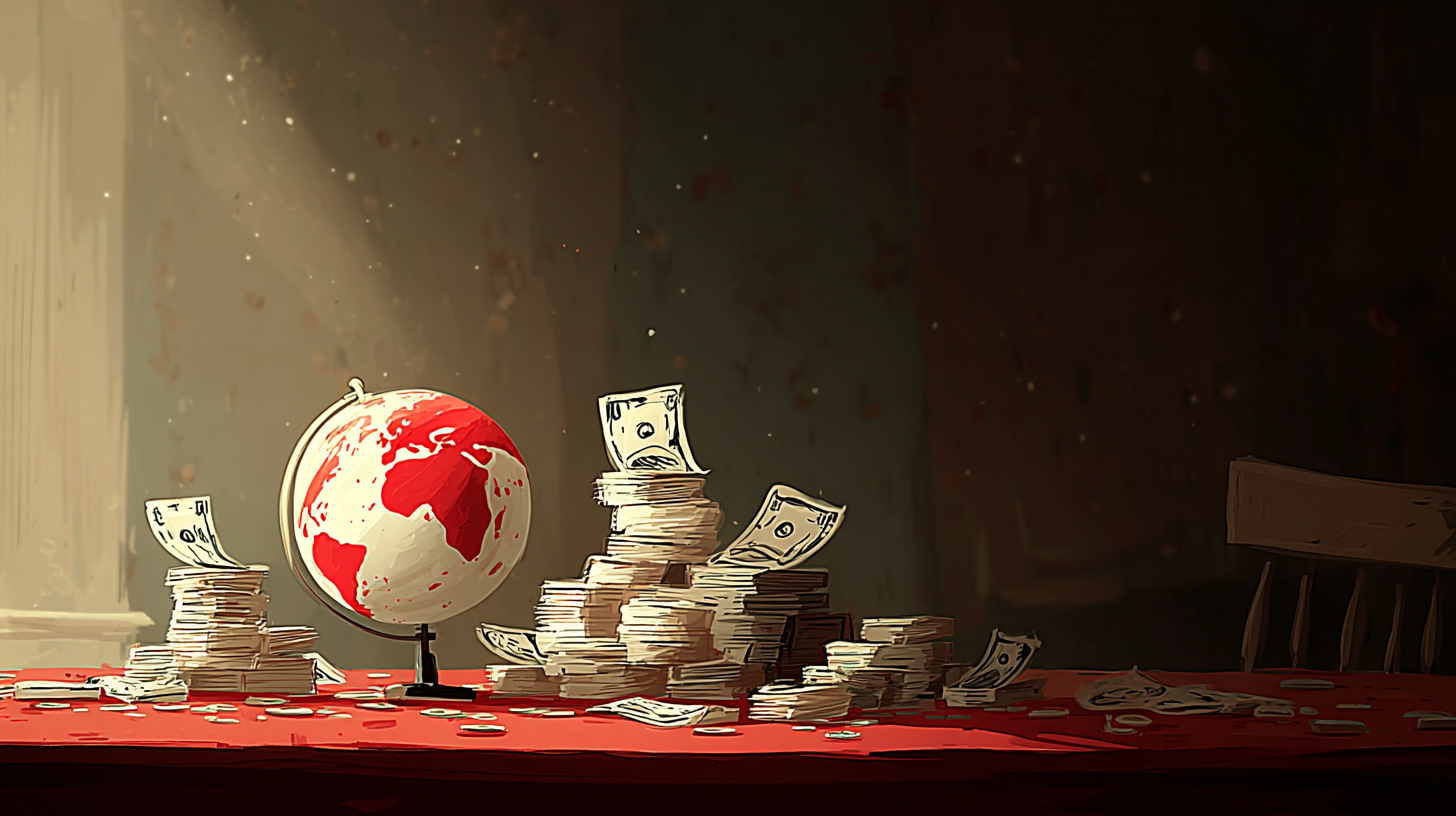A dollar is the money unit used in the U.S. and some other countries.
dollarはアメリカなどで使うお金の単位
以下は英単語 “dollar” に関するストーリー型学習コンテンツです。まずは大枠の意味を理解して最後の文章で確認しましょう。
主な意味(main meaning)
| 品詞 | 意味 | 発音記号 | 例文 |
|---|---|---|---|
| 名詞 | アメリカなどの通貨の単位(ドル) | /ˈdɑːlər/ | I paid ten dollars for this book. |
語源(etymology)
「dollar」は16世紀にドイツ語 Thaler(銀貨の名前)から英語に入った。もともと「銀の硬貨」という意味で、後にアメリカの通貨単位の名前として使われるようになった。
→ 核イメージは「価値を持つ貨幣単位」。
類義語(synonyms)
| 類義語 | 意味 | 例文 |
|---|---|---|
| currency | 通貨 | The local currency is weaker than the dollar. |
| money | お金 | She saved her money to buy a new phone. |
| cash | 現金 | He paid in cash instead of using a card. |
| coin | 硬貨 | I found a coin on the street. |
反義語(antonyms)
| 反義語 | 意味 | 例文 |
|---|---|---|
| debt | 借金 | He was in debt after losing his job. |
| poverty | 貧困 | Many families live in poverty without enough money. |
コロケーション(collocations)
| コロケーション | 例文 |
|---|---|
| U.S. dollar | The U.S. dollar is strong this year. |
| dollar bill | I have a five-dollar bill in my wallet. |
| dollar store | She bought some plates at the dollar store. |
| dollar value | The dollar value went up compared to last month. |
2項表現(binomials)
| 2項表現 | 例文 |
|---|---|
| dollars and cents | He calculated every cost in dollars and cents. |
| cash and credit | You can pay by cash and credit. |
英語ストーリー(english story)
The Dollar Decision
One summer afternoon, Emma, a young woman who had just started working at a travel agency, was asked by her manager to prepare a report on currency exchange. The company often dealt with customers from different countries, and the U.S. dollar was the most common currency they needed to handle.
Emma opened her laptop and began writing. She typed: “The U.S. dollar is the official currency of the United States. It is also used in many other countries. The dollar is often compared with other currencies, and its value goes up and down depending on the global economy.”
As she wrote, she remembered her own experience last year. She had traveled to Canada. At that time, she noticed the difference between the U.S. dollar and the Canadian dollar. Even though both were called “dollars,” their value was not the same. Emma thought it was fascinating that one word could mean different amounts of money in different countries.
Later, her friend Tom came to visit her office. Tom was worried because he was in debt. “Emma,” he said, “I borrowed some money to buy a new car, but now I don’t have enough dollars to pay it back.”
Emma felt sorry for him, but she encouraged him. “Don’t worry, Tom. If you save money little by little, you will get out of debt. Poverty is hard, but you are not in poverty. You have a good job. You just need to plan carefully.”
Then they went to lunch together. At the restaurant, Tom paid with a five-dollar bill. The cashier gave him change in coins. Tom laughed and said, “It feels like I’m counting every dollar and cent these days.”
Emma smiled. “That’s not a bad thing. Knowing the value of every dollar helps you avoid wasting money. Some people don’t care about their spending until it’s too late.”
When they returned to the office, Emma finished her report. She added a section about the importance of the currency exchange rate. She also explained that many people still prefer to use cash even though credit cards are popular. Finally, she concluded: “The value of the dollar may change, but its importance in the world economy will remain strong.”
Her manager read the report and nodded. “Good work, Emma. You explained it clearly.”
On her way home, Emma thought about Tom again. She believed that one day, when he managed his money better, he would finally be free from debt. She realized that the dollar was not just about paper bills or coins. For many people, including Tom, it represented their choices, their freedom, and their future.
和訳
ドルの決断
ある夏の午後、旅行会社に入ったばかりの若い女性エマは、上司から為替に関するレポートを作成するよう頼まれた。会社にはいろいろな国からの客が来るため、最もよく扱うのはアメリカの通貨(currency, 通貨)、つまりドル(dollar, ドル)だった。
エマはノートパソコンを開き、書き始めた。「アメリカドル(U.S. dollar, アメリカドル)は、アメリカの公式通貨です。また、他の多くの国でも使われています。ドルの価値は他の通貨と比べられ、世界経済によって上下します。」
書いているうちに、去年の自分の経験を思い出した。カナダへ旅行したとき、アメリカドルとカナダドルの違いに気づいたのだ。どちらも「ドル」と呼ばれているが、その価値は同じではなかった。エマは「一つの言葉が国によって違う金額を意味するなんて面白い」と思った。
その後、友人のトムが事務所を訪ねてきた。トムは**借金(debt, 借金)**に悩んでいた。「エマ、車を買うためにお金を借りたんだけど、返すだけのドルが今はないんだ。」
エマは気の毒に思ったが励ました。「大丈夫よ、トム。少しずつ貯金すれば借金は返せるわ。貧困(poverty, 貧困)はつらいけど、あなたは貧困じゃない。ちゃんと仕事もあるし。ただ計画的にやればいいのよ。」
二人は一緒に昼食に出かけた。レストランでトムは**5ドル紙幣(five-dollar bill, 5ドル紙幣)で支払い、店員がお釣りを硬貨(coin, 硬貨)で渡した。トムは笑って言った。「最近は1ドル1セント(dollars and cents, ドルとセント)**まで数えてる気がするよ。」
エマは微笑んだ。「悪いことじゃないわ。1ドルの価値を大事にすれば、無駄遣いを防げるもの。多くの人は気づいたときには遅すぎるの。」
会社に戻ったエマはレポートを仕上げた。為替レート(currency exchange, 通貨交換)の重要性を説明し、クレジットカードが普及しても多くの人が**現金(cash, 現金)**を好むことを書いた。そして結論にこうまとめた。「ドルの価値は変動しても、世界経済における重要性は変わりません。」
上司はレポートを読み、うなずいた。「よくできたね、エマ。分かりやすく説明している。」
帰り道、エマは再びトムのことを考えた。お金をうまく管理できるようになれば、いつか彼は借金から解放されるだろう。エマは、ドルはただの紙幣や硬貨ではなく、人々の選択、自由、そして未来を表しているのだと感じた。
Q&A
Q: dollar と currency の違いは?
A: dollar は具体的な通貨単位(アメリカドルなど)を指します。
一方で currency は「通貨」全般を表す広い言葉で、円、ユーロ、ドルなどすべてを含みます。
Q: dollar と money の違いは?
A: dollar は「ドル」という決まった単位を表します。
money は「お金」全体を指す言葉で、円でもドルでも使えます。
Q: dollar と cash の違いは?
A: dollar はドルという特定の単位を示します。
cash は「現金」で、ドルでも円でもユーロでも現金ならcashです。
Q: dollar と coin の違いは?
A: dollar は通貨の単位そのもの。
coin は「硬貨」という形態を表す言葉で、ドル硬貨も円硬貨もcoinです。
Q: dollar と debt の違いは?
A: dollar はお金そのものの単位。
debt は「借金」で、お金が足りずに人から借りている状態を表します。
Q: dollar と poverty の違いは?
A: dollar はお金を数える単位。
poverty は「貧困」という生活状態で、お金が足りないことを意味します。
Q: dollar と U.S. dollar の違いは?
A: dollar は一般的に「ドル」という単位を指し、アメリカ、カナダ、オーストラリアなど複数国で使われています。
U.S. dollar はその中でも「アメリカドル」を限定して指します。
Q: dollar と dollar bill の違いは?
A: dollar は「ドル」という単位。
dollar bill は「ドル紙幣」という形態を表す言葉です。
Q: dollar と dollar store の違いは?
A: dollar はお金の単位。
dollar store は「1ドル均一ショップ」を意味する表現です。
Q: dollar と dollar value の違いは?
A: dollar は単位そのもの。
dollar value は「ドルの価値」という意味で、他の通貨や経済状況と比べた価値を指します。
Q: dollar と dollars and cents の違いは?
A: dollar は単純に通貨単位。
dollars and cents は「細かい金額まで正確に」や「お金に関するすべての細部」という表現になります。
Q: dollar と cash and credit の違いは?
A: dollar はお金の単位。
cash and credit は「支払い方法」(現金かクレジットカードか)を示す表現です。



コメント